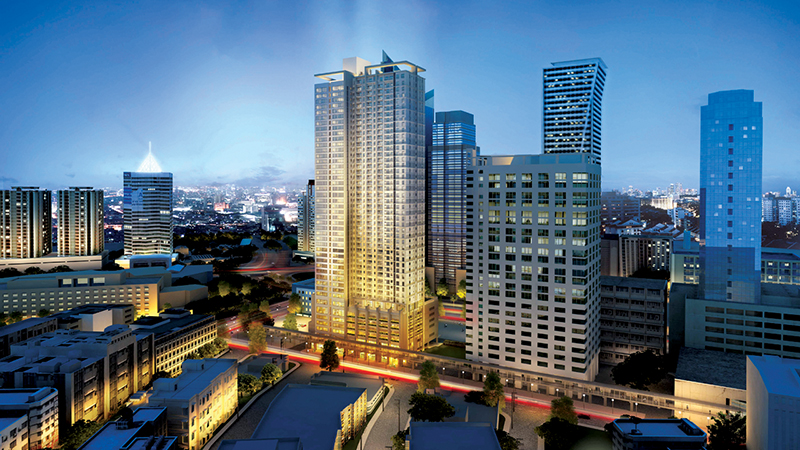Property In Brief
Phnom Penh:
Condo Confidence Growing in Phnom Penh
While the 2007-2008 economic downturn signaled a downturn in condominium developments in the Cambodian capital, the trend has been reversed, according to a report by CBRE Cambodia Research. Confidence in the viability of condo developments is growing, the study found, largely due to the successful projects like De Castle Royal, which is not scheduled to open until later this year but whose units are already 90 percent sold. That project is only the most successful condo development in a growing field, and completed projects are seeing sales rates in the 80 percent range. The strong interest from foreign buyers has helped drive sales, the report said, with foreigners making up some 65 percent of purchasers in some condominium complexes. While De Castle Royal and other projects have been praised for the high quality of their materials and construction methods, there are some concerns that the market could become saturated, especially since many Cambodians do not yet appear to be eager to move into condos.
Cambodia:
Property Prices Rise in Central Siem Reap
Land prices in central parts of Siem Reap have increased steadily since 2008, despite the impact of the global economic crisis elsewhere, according to a recent study. Land prices in the city known as the gateway to Angkor Wat in early 2014 were up 15 percent compared with the first half of 2013, the study by KEY Real Estate found. The average price of land was US$1,010 per square meter. The reason for the increase was the strong, continuous growth of the tourism sector as increasing numbers of visitors pour into the city every year to see the nearby temples. Sorn Seap, Key Real Estate general manager, told the Phnom Penh Post that he expected the upward trend to continue due to predicted economic growth, increased numbers of foreign investors, and ASEAN economic integration, set for the end of 2015. The number of foreign tourists coming to Cambodia grew from 3.5 million in 2012 to 4.2 million in 2013, an increase of 17.5 percent.
Cambodia:
Tourists, ASEAN Boost Property Outlook in Sihanoukville
Increasing numbers of tourists to coastal Sihanoukville are pushing property values there upward, making the overall outlook more positive this year than in 2013. Cheng Kheng, director of CPL Real Estate Company and president of the Cambodian Valuers and Estate Agents Association, told the Phnom Penh Post that the larger numbers of tourists as well as the upcoming ASEAN integration have improved the property market outlook. Land prices in the city’s commercial district range from US$1,000 to US$1,500 per square meter while land prices on Otres Beach are between US$500 and US$600. At the popular Ochheuteal Beach, prices are upwards of US$1,000 per square meter. But to maintain growth, he added, the city needs a bigger airport, which would allow businesspeople and tourists to arrive directly from overseas. Such improved access could double land prices, he said.
Cambodia:
Koh Puos Development Nears Possible Relaunch
The long-delayed development of Snake Island, or Koh Puos, off the coast of Sihanoukville could kick off soon as a new blueprint for the 116-hectare residential and resort complex is almost complete. Kheam Kolneath, public relations manager of the Koh Puos (Cambodia) Investment Group (KPIG), told the Phnom Penh Post that the group’s director was overseeing the final stages of the blueprint development with an architect from the US-based firm Interstate Hotels and Resorts. The Cambodian government signed a 99-year lease for the land on Koh Puos, also known as Morakot Island, with Russian KPIG. While the company has already invested US$100 million on a bridge connecting the island to the mainland, other infrastructure projects remain incomplete. Twenty villas are also being constructed, but progress has been slow, Kolneath said. KPIG has said the new plan will increase the project budget from US$276 million to US$1 billion. According to Kolneath, the blueprint will likely be finished by the middle of the year.
Cambodia:
Phnom Penh Scores Well in Asian Real Estate Index
A new report by Knight Frank that determined prices of prime residential and commercial development land in 13 cities across Asia has ranked Phnom Penh in the fifth spot. The Knight Frank Asia Pacific Prime Asia Development Land Index found that Southeast Asian markets are seeing the fastest price growth for prime development land. Bangkok topped the list, with Jakarta, Kuala Lumpur and Beijing in second, third and fourth places respective. Phnom Penh came next, ranking fifth overall in the region in terms of increases in price for residential and office space, averaging just over 35 percent over the past 24 months. “Phnom Penh … saw both its indices increase rapidly, driven by increasing demand from domestic and international players,” the report said.
Myanmar:
Rising Rents in Yangon Put the Squeeze on Businesses
Rents for retail space in the Myanmar capital are rising as much as 50 percent per year, hurting small and medium-sized enterprises but also big businesses, which are being forced out of profitable areas of the city. For example, the rent for a convenience store went from US$500 to US$1,500 in just four years, one shop chain owner complained to the Myanmar Times. In terms of start-up costs for store openings, rent accounts for 40 percent, he added. The skyrocketing costs are threatening traditional retail hubs and many have had to move out of popular downtown locations. But even that isn’t solving their problems. Demand for the retail hubs that have formed on the city’s outskirts is pushing rents up there. New retailers are worried about investing in the market given the price increases, Ko Min Min Soe from the Mya Pann Thakin Real Estate Agency told the paper. The high monthly costs mean they can no longer afford amenities such as modern shop fittings and air conditioning or closed-circuit security cameras.
Thailand:
Chiang Mai Enjoying Mini Boom
Chiang Mai in northern Thailand has been flourishing in recent years on the back of a jump in tourism, the arrival of big retailers and an increase in infrastructure development. According to the Bangkok Post, experts say prospects remain bright with the expansion of the Chiang Mai airport, ASEAN economic integration and the construction of new transport networks. Floods in late 2011 have also helped boost the local economy, driving up residential demand as Bangkok was especially hit by high waters and people and firms began looking to the provinces to buy and invest. Big-brand developers from the capital started looked north as did homebuyers, who bought for investment purposes or to rent out, Seri Karunathep, vice-present of Quality Houses Plc, told the paper. Tourism has also been a driver of the resurgence, fuelled by a new wave of Chinese tourists alongside regular visitors from Europe and Japan. The city’s central location also helps, since it is well suited as a hub for tourism, logistics, investment and border trade, observers said.
Vietnam:
Lack of Confidence Hurting Housing Recovery
The three-year slump that Vietnam’s housing market finds itself in might well be prolonged until 2015 as confidence remains low that things will turn around this year. According to an analysis by CBRE Group Inc., while the economy has stabilized, there is a lack of confidence and fears that interest rates are going back up. “We’ve still got issues that are holding us back,” CBRE Executive Director Richard Leech, based in Hanoi, told Bloomberg. In Hanoi, CBRE said only 1,500 condominiums were sold in the first quarter. That is a fivefold increase from the number sold in the same period two years ago, but far down from 2009, when more than 15,000 units were sold in the capital. In Ho Chi Minh City, first-quarter sales were 2,263, down from a peak of 13,000 condos sold in 2010. Lenders are now putting together a loan package to stimulate the property market and interest rates were cut in March to boost growth. Since a lot of wealth is tied up in real estate, many Vietnamese have seen their wealth on paper decline as much as 30 percent in the last few years.
Macau:
Sky-high Property Prices Drive Out Locals
Home prices in Macau have tripled since 2009 as gaming revenues have steadily grown, making home ownership out of reach for many residents. Macau, the world’s gambling capital, is opening more than 17,000 new hotel rooms over the next three years to keep pace with a flood of visitors from mainland China. At the same time, only about 4,000 affordable homes for locals are expected to be built during that time. An average apartment in Macau now costs US$500,000, making the city one of the most expensive in the world to buy property, even outranking Hong Kong. Some residents, priced out at home, are choosing to buy in Hong Kong or moving even further afield to places like Thailand. In March, more than 40,000 people competed for 1,900 affordable housing units. That represents the lack of a long-term plan for affordable housing and is widening inequality, lawmakers and property consultants say. It has become such a problem that even well-paid foreign executives in the casino industry are finding Macau prohibitively expensive.
China
Real Estate Firms Squeezed as Housing Market Slows
China could soon see a good number of its 90,000 real-estate companies close their doors as the government reins in credit and the overheated housing market cools. An early sign of things to come, according to an article by Bloomberg news, is the insolvency of Zhenjiang Xingrun, a developer based in Fenghua, south of Shanghai. The company is US$562 million in debt and its residential property development has been halted. Such a scenario could be in the cards for many developers, who binged on easy credit for years. But now thousands of apartment buildings are sitting empty across the country and the government appears reluctant to provide further stimulus to fill them. Several observers, including CBRE Global Investors, say that China has too many real-estate companies anyway and that consolidation is sorely needed. Richard van den Berg, country manager for China at CBRE, said there are about 30,000 “true” developers, and that number is too many, even for a country the size of China.
Philippines:
Soaring Prices Move Pension Fund to Sell off Assets
As land prices in the Philippines jump to a 16-year high, the country’s largest pension fund is planning its biggest sale of real estate ever. The fund, the Government Service Insurance System (GSIS), with about US$16.3 billion in investable assets, has identified eight properties to sell at public auctions this year, Bloomberg reported. Those properties are part of a US$693 million real-estate portfolio that is not earning income, GSIS President Robert Vergara said. Land prices in parts of Manila have jumped 17 percent in the fourth quarter on the back of economic growth, rising remittances from Filipino expats and record-low borrowing costs. Vergara said in mid-March that due to the phenomenal increase in property prices, it is a good time to realize value while liquidity is plentiful and investors are interested. Manila was ranked the fourth most-popular real-estate investment destination behind Tokyo, Shanghai and Jakarta for 2014, according to a survey by the Urban Land Institute and PricewaterhouseCoopers. The country’s economy expanded 7.2 percent in 2013 and 6.8 percent in 2012, the fastest two-year pace since the 1950s.
- Video Advertisement -



 ខ្មែរ
ខ្មែរ







